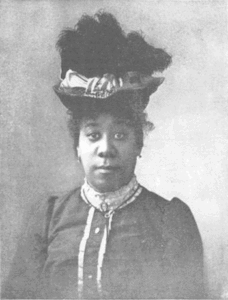
Pauline Hopkins
*The birth of Pauline Hopkins in 1859 is celebrated on this date. She was a Black playwright, journalist, novelist, short story writer, biographer, and editor.
Pauline Elizabeth Hopkins was the daughter of Northrup Hopkins and Sarah Allen. She was born in Portland, Maine, and raised in Boston, Massachusetts. Her writing skills gained recognition in 1874 when, at age fifteen, she received first prize in a contest for her essay "Evils of Intemperance and Their Remedy."
At age twenty, she completed her first play, Slaves' Escape, or the Underground Railroad, which was later performed in stage production and renamed Peculiar Sam or The Underground Railroad. From 1900 until 1904, she served as writer and editor-in-chief for Colored American Magazine (CAM). During this time, two series' were published that presented biographical sketches of African American women and men of note: "Famous Women of the Negro Race" and "Famous Men of the Negro Race."
Hopkins also wrote several short stories and essays that appeared in CAM. Her first novel, Contending Forces: A Romance Illustrative of Negro Life North and South, was published in 1900. Hopkins's association with CAM ended in 1904 when an ally of Booker T. Washington, who disliked her editorial perspectives and "unconciliatory politics," bought the magazine and fired her." Hopkins did continue to write, serving as editor of the New Era Magazine in 1916, but her literary productivity declined sharply after 1905. She was employed as a stenographer at the Massachusetts Institute of Technology at the time of her death in Cambridge, Massachusetts, in 1930.
In the mid-1980s, scholars began to rediscover Hopkins. In 1988, Oxford University Press reprinted her novels and most of her short stories in its Schomberg Library of Nineteenth-Century Black Women Writers series, which Henry Louis Gates edited. She is best remembered as a pioneer in using the traditional literary form of the romantic novel to explore and challenge racial and gender representations of middle-class Blacks in the early part of the twentieth century.
In addition, during her tenure at the Colored American Magazine -- one of the first major literary magazines targeted at a predominantly African American audience-- she is credited with laying the groundwork for the evolving African American literary style that would later become associated with the literature of the Harlem Renaissance. She has been characterized as "One of the most prolific African American woman writers and the most influential literary editors of the first decade of the twentieth century."